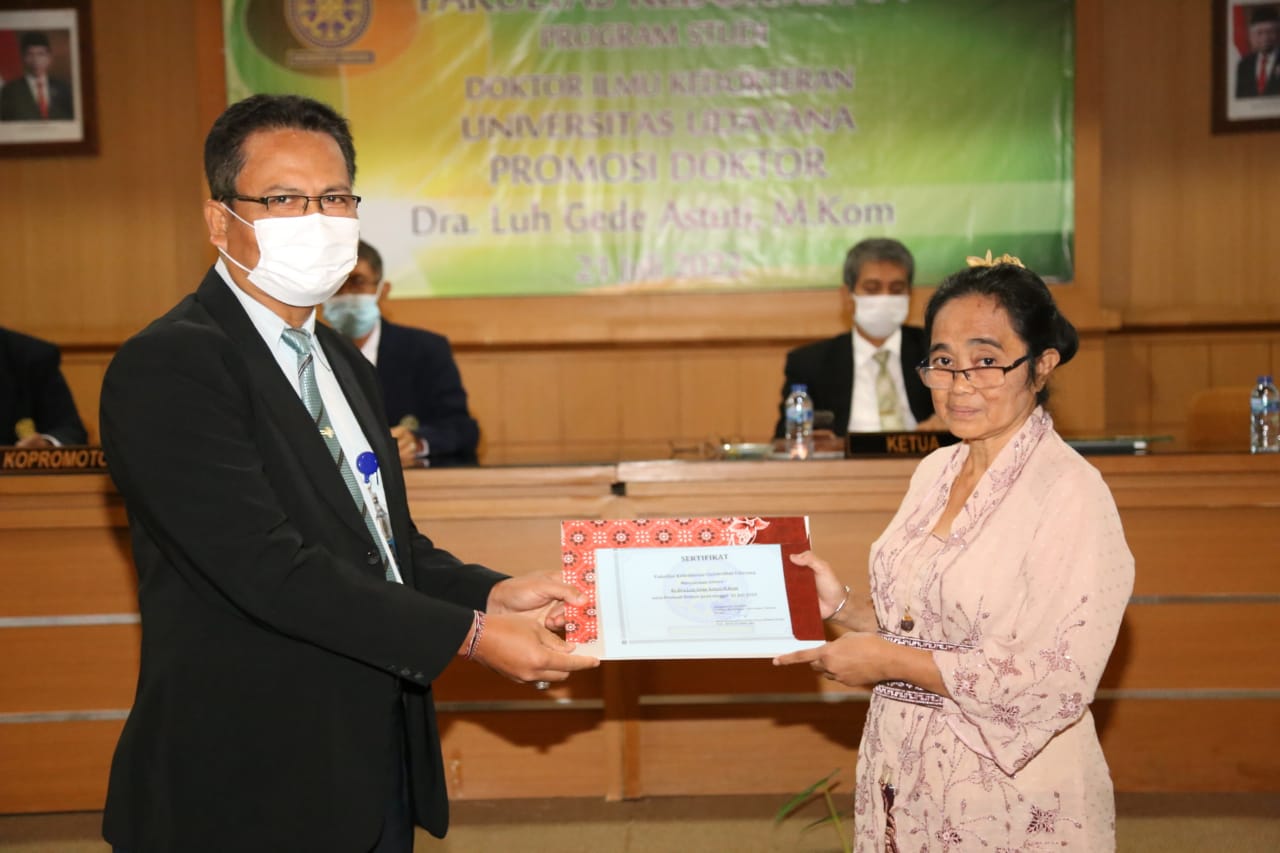Ergo-Learning Has the Potential to Reduce Academic Stress and Improve Student Health
Thursday, July 21, 2022
Located in the third floor courtroom, Postgraduate Building, Denpasar, the Doctoral Promotion exam was held with promovenda candidate Dra. Luh Gede Astuti, M.Kom who raised the dissertation title "Ergo-Learning in Expert System Programming Learning Improving the Quality, Learning Outcomes and Usability of Products Produced by Students in the Computer Science Department, Udayana University."
In learning expert system programming, learning outcomes need to be improved to face global competition in the world of work. There are three cognitive loads that must be accepted by students (students). The three cognitive loads are intrinsic, extrinsic and constructive, where the intrinsic load in programming is quite high. In reducing the intrinsic cognitive load of expert system programming learning using conventional methods where students type coding from a simple expert system application.
From retyping coding students are expected to be able to analyze coding, and understand the flow of the application. In this learning model there are problems in the health sector with indicators of complaints of fatigue, boredom and academic stress which have an impact on decreasing learning outcomes.
Less than optimal learning outcomes also result in the output of expert system learning, namely the product of expert system applications. In conventional learning there is a problem, namely timely production is carried out in less than optimal learning conditions. This has an impact on expert system applications with less than optimal Usability values. Therefore, various efforts are needed to create an optimal design of student programming learning models.
Every effort to improve the learning process should be equipped with studies from various aspects. Improvements in the learning process have been carried out by various studies, but the discussion and analysis is still based on one aspect only so that new problems often arise. Total Ergonomics Approach (PET) is one of the models of ergonomics approach that is able to create learning conditions that are humane, competitive and sustainable.
PET aims to prevent new problems from arising because problems are analyzed comprehensively and are the result of mutual agreement. The process of applying PET in an effort to improve the first step is workshops and lectures. The research subjects were students who took introductory artificial intelligence courses, students who had received expert systems courses, other bestari partners were all present. In the workshop, it was agreed that improvements would be made by adding simple expert system programming to the expert system application module, identified 33 problems, priority issues that were urgent, important and essential, 12 work plans and 5 urgent action plans.
The essence of improvement is a systematic problem analysis, using appropriate technology, based on studies of various disciplines and experiences as well as the participation and commitment of all parties. The implementation of the action plan was preceded by designing a special e-learning for learning expert system programming, which was compiled based on the steps in implementing a simple expert system. In e-learning, ergonomic and non-ergonomic body position information is inserted in activities with computers. Other action plans promote active rest, provide snacks (bread and water) and provide basic yoga stretches in between working on questions in e-learning.
Therefore, the improvement of the learning process with PET is prioritized on reducing the cognitive and physiological load of students which is integrated into an intervention called Ergo-Learning. After Ergo-learning was created, further research was carried out by means of an experiment using a Randomized Pre-Test-Post Test Control Group Design research design. The research was carried out from June 2021 to September 2021, with 46 students taking introductory courses on artificial intelligence in the Department of Computer Science (Ps. Informatics). Subjects were divided into 2 groups. The control group (KK) was given the treatment of doing expert system programming learning conventionally without Ergo-Learning while the Treatment Group (KP) used Ergo-Learning.
Data analysis was performed using the Mann-Whitney test and the t-Group test.
The results of data analysis in this study indicate the influence of the Ergo-Learning model on the learning process of expert system programming.
It is concluded that Ergo-Learning in expert system programming learning can improve the quality of health in terms of reducing academic stress, decreasing fatigue, and decreasing boredom. Ergo-Learning can also improve the quality of learning and increase the usability value of the resulting expert system.
Led examby the Dean of the Faculty of Medicine, Udayana University, Dr. dr. Komang Januartha Putra Pinatih, M.Kes. with the test team:
1. Prof. Dr. dr. I Putu Gede Adiatmika, M. Kes (Promoter
2. Prof. Dr. dr. I Nyoman Adiputra, M.OH., PFK (Copromotor I
3. Prof. dr. Ketut Tirtayasa, MS., AIF (Copromotor II
4. Prof. Dr. dr. J. Alex Pangkahila, M. Sc., Sp. And (KSAAM
5. Prof. Dr. Drs. I Made Sutajaya, M.Ke
6. Dr. Ir. Ida Bagus Alit Swamardika, M.Er
7. Dr. dr. Susy Purnawati, M. K
8. Dr. dr. Luh Putu Ratna Sundari, S. Ked., M. Biome
While the academic invitations ar
1. Dr. Ir. I Ketut Gede Suhartana, S. Kom., M. Ko
2. Dr. M. Yusuf, S. Si., M. Er
3. Dr. dr. I Made Muliarta, S.Ked., M.Ke
4. Dr. Luh Made Indah Sri Handari Adiputra, S. Psi., M. Er
5. Dr. dr. I Made Krisna Dinata, M. Er
In this exam, Dr. Dra. Luh Gede Astuti, M.Kom was declared graduated as the 351st Graduate Doctoral Program of Medical Sciences, Faculty of Medicine, Udayana University with the predicate VERY SATISFACTORYggsgme:dKgs))))










